10 de enero 2023

The Return of the Military

PUBLICIDAD 1M
PUBLICIDAD 4D
PUBLICIDAD 5D
In Costa Rica’s hidden labor world in pineapple production, commerce and construction, there are no vacations, Christmas bonuses or rights
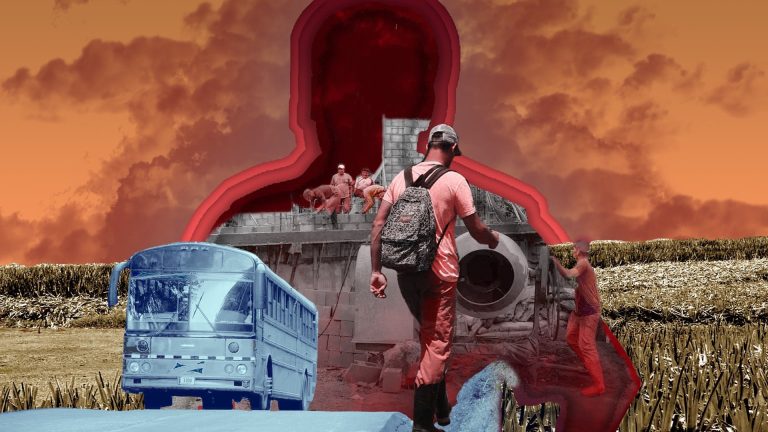
Delvis lost his right leg on a Coopepiña farm when his boss pressured him to clean up a high-voltage area. Carlos was fired after founding a union. Twenty workers who were building an expensive oceanfront house in Cabo Velas, Guanacaste, were injured when they were transported to the construction site piled into the back of a truck. Laura was fired when she complained that she was being exposed to lightning in the field where, a couple of months earlier, lightning burned a laborer to death during a storm. Employees of a chain store were beaten with pipes, and workers at a discount supermarket were yelled at and humiliated during twelve-hour shifts, six days a week.
All of these people are unheard of. They are construction workers, agricultural laborers, employees in discount supermarkets and store clerks. But they have something in common: they are Nicaraguan immigrants– most of them without work permits– human beings who felt forced to leave their country due to lack of opportunities and an authoritarian government regime that represses and imprisons those who oppose it.
They cross the border into Costa Rica in hopes of finding employment and protection here, but in many cases, what they find are deplorable job security conditions, physical abuse, psychological ill treatment, and wages that are lower than that of Costa Ricans.
“I was surprised that [my employers] had taken away my insurance. And since I don't have my payments current, I can't claim the pension,” a former pineapple worker told us.
“There are twelve hours of work every day, without overtime pay, with an eight-hour salary, without a bonus, without vacations, without health insurance,” a low-cost supermarket worker told us.
“Every day, we walk around in the midst of the chemical. And that’s too sensitive, because we have it on our clothes and we come [home] to throw it inside, where our families are,” Carlos also told us.
These voices belong to the most unprotected group, the thinnest segment of a thread where businesses worth hundreds of millions of dollars a year pull the strings in Costa Rica, but they act almost freely, without greater State controls.
In these prosperous sectors of the Costa Rican economy, a group of companies resort to the legal figure of "contractors," whose function is to mediate between companies that need labor and Nicaraguan workers who are looking for work, in many cases, having just arrived as “wetbacks” fleeing the misery and the political crisis in Nicaragua.
“Contractor” is, in fact, a term we came across frequently in the course of this investigation by media allies Confidencial, from Nicaragua; and The Voice of Guanacaste and Interferencia de Radios UCR, from Costa Rica.
Everyone talks about this figure: "the contractor keeps part of the salary," "the contractor doesn’t enroll me in the [Costa Rican Social Security] Fund," the contractor "doesn’t give me protection equipment." But, for all practical purposes, the references are vague. Just a first name or the address of a house where he sometimes sees people.
Identifying and finding these contractors then becomes an enormous challenge in the midst of the tangle in which responsibilities for the rights of immigrants are diluted. Contractors don’t usually have a business name, nor do they form groups like a chamber or trade association. The channels they use to recruit workers are word of mouth and referrals from one immigrant to another about who can give them work even if they don’t have papers.
Many people know where to find contractors, except when a journalistic team looks for them to confront them with workers’ complaints. Then their whereabouts become a mystery. That’s why we set out to look for them to learn about their work and confront them with testimonies from people.
Delvis Castillo is a 38-year-old Nicaraguan who lives with his significant other, his youngest daughter and his two dogs, a schnauzer and a mongrel, in a simple wooden house located next to a small pineapple field. We visited him there at the beginning of one of those September afternoons when the heat is so emphatic that it could melt thermometers.
He’s a dark-complected and heavyset man, wearing huge white Bermuda shorts and an orange shirt, and he only has one leg. He moves from one side of the house to the other with difficulty, supported by a pair of simple aluminum crutches.
At first, he had qualms about recalling the moment he lost his leg. He beat around the bush shyly. “They say that remembering is reliving and that hurts,” he confessed to us.
Then his gaze fixed on some point in the past and he began to speak:
“On January 8, 2016, I suffered an electric shock from three transformers. I worked for Coopepiña and for days, they had been asking me to do a job in an area in which I wasn’t trained.”
The company's order was for him to clean up the mud accumulated in a high-voltage area where three electrical transformers operated.
He remembers that he was avoiding his boss that day so he wouldn't see him, but he finally found him and insisted again. Delvis argued that he didn’t have experience working with electricity and told him that, in addition, protective equipment was needed for the task.
His boss's response was that the company wasn’t going to spend money on a protective suit that would just be used for a moment and nothing more. Finally, they threatened him with the trite (but effective) phrase that outside the farm, there were a bunch of unemployed people longing for his position. Delvis thought of his family, demanded they turn off the power, and reluctantly agreed.
They assured him that the transformers were disconnected.
“I trusted the boss's word. They told me that they had disconnected the transformers, but it was a lie,” he said bitterly.
When he entered the high-voltage room, the electric current was live and unforgiving.
“These photos are from days after the accident,” he explained as he shared some images that show his head, torso and leg full of wounds, bruises and scars.
"My leg was completely charred."
The company where Delvis worked is known as Coopepiña, but its formal name is Cooperativa de Comercio y Servicios Múltiples de Productores de Piña de Pital. The company is a conglomerate of 35 producers from San Carlos, in the province of Alajuela. From there, they grow and export fresh fruits to Italy, Switzerland and Germany.
Delvis recalls indignantly that, after the accident, he was admitted to the Trauma Hospital for 19 months. Then he shares with us a copy of a document that he signed with the former president of the cooperative's Board of Directors, Rafael Chaves Arias, and with other associates.
In that agreement, authorities from Coopepiña promised to pay him an out-of-court settlement and to keep his employment relationship. However, Delvis alleges that he was never paid what was agreed upon and that, some time later, he was fired. Sometimes it’s not "the contractors" but rather the companies that leave the workers unprotected.
Because of being fired, Delvis sued the cooperative and obtained a ruling in his favor in the Alajuela Labor Court, according to documents provided by him. Coopepiña's lawyer appealed the sentence and, six years after the accident occurred, that judicial process is still pending. Delvis still hasn’t received the 1.8 million colones (about $3,000 dollars) that the judge ordered that they pay him.
To find out the cooperative's side of the story, we spoke with Rafael Chaves Arias, former president of Coopepiña’s Board of Directors, whose signature appears on the settlement document that Delvis shared with us. However, Chaves did not want to comment on the case. He claimed that the stress he went through when he was president of the cooperative caused him mental health problems and referred us to the cooperative’s current authorities.
We also sought the version of Coopepiña’s manager, Adrian Rodriguez Varela, who responded by email, attributing responsibility for the accident to Delvis.
"It’s true that there was an unfortunate accident at work by Mr. Delvis Castillo, due to the lack of the duty to be careful that he himself committed," the email read.
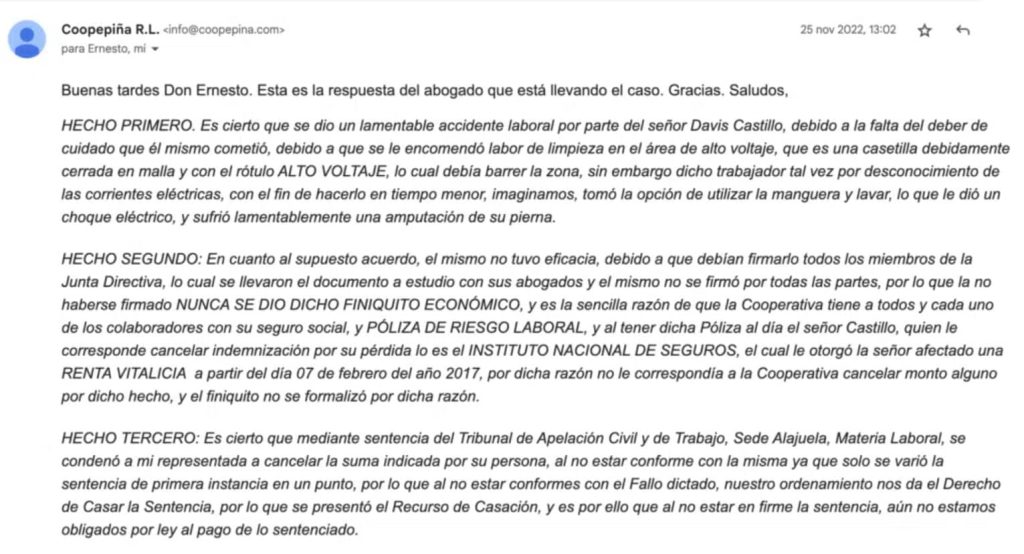
In the coastal areas near Tamarindo and Nosara, it’s common to see hundreds of construction workers descending from the hills, where million-dollar houses and condominiums are built, towards their temporary housing, where they usually live overcrowded. Photo: Ruben Roman.
Regarding not fulfilling the settlement agreement that they signed after the accident and the amputation, Coopepiña's version is that this agreement did not have legal "effectiveness" or did not go into effect because it was not signed by all of the company executives. In other words, the cooperative's lawyers found a legal loophole to not honor the commitment that the president of the cooperative’s Board of Directors had acquired after the accident.
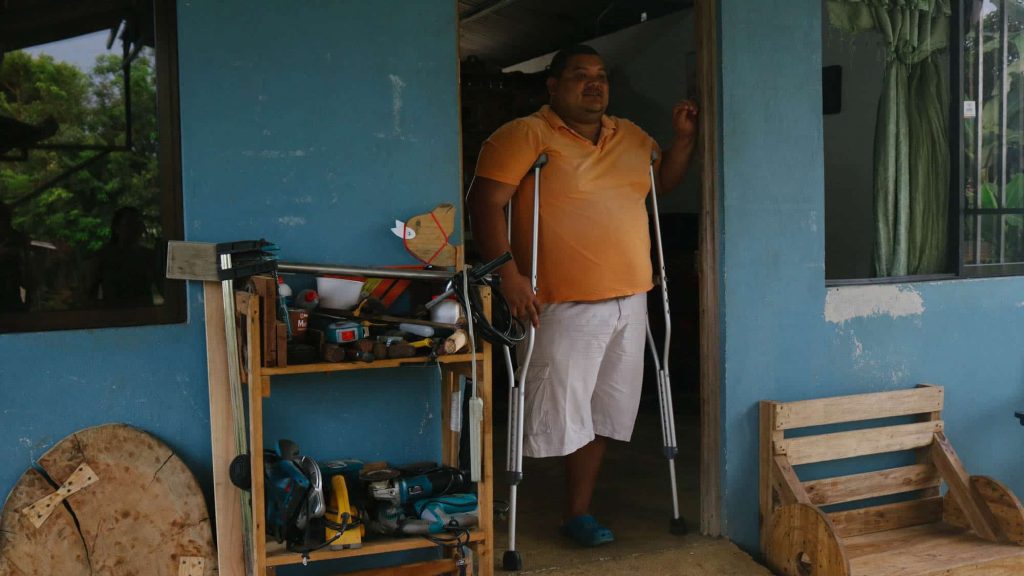
"I have faith that my file will reach the hands of a judge, a magistrate or whatever and things will be put as God commands," says Delvis Castillo, a former employee of the company Coopepiña. Photo: Maria Laura Molina.
The interview with Delvis lasted until the evening began to cool down what remained of the afternoon and a light breeze eased the heat a bit. Delvis took his crutches and led us to his house’s patio. There, he has some tools to make wooden chairs and tables. Before, he also fattened chickens and sold lottery tickets to earn something and survive.
"Doors close on you. That’s what one feels, I’m not going to tell you no,” he said before we got in the car. His face, brown and glistening with perspiration, reflects a mixture of indignation and anguish.
Under the same burning sun in San Carlos, but in another of the pineapple farms, we met a farm worker who we’ll call Carlos to protect his identity. Carlos came from Nicaragua more than 20 years ago and has worked for several of the companies in Boca Arenal.
Carlos is cautious, frugal and afraid of losing his job. He said that he has suffered a lot of persecution and he needs to take care of his family. When we asked him if he filed a complaint due to union persecution, his eyes lit up and he expressed his distrust of the independence of those who have the duty to monitor the companies.
"The Ministry of Labor has come, when one requests it, but still, that's like calling the farm’s owner and filing the complaint with him. It's the same thing,” he emphasized with a gesture of disgust. “The Ministry of Labor is an accomplice in all the vulgarity that they’ve done to us.... What they do is pure display”.
According to Carlos, some companies use hiring filter “black lists” that include former union members. "People are afraid. Imagine, as a union leader, what can I say to a worker when they know that no company gives me a job because I was a union member?”
Carlos continues working as a laborer on farms that don’t have a record of his union work. He continues to denounce injustices, but now he prefers to do so without exposing himself as much. He explained to us that on many pineapple farms, the laborers spend long shifts without receiving hydration, in extreme temperatures or they are kept in the field during electrical storms and are exposed to lightning.
“In addition to that, every day, they throw the ical on us and that’s too sensitive, because we have it on our clothes and we come [home] to throw it inside, where our families are. In some companies, they have laundries, but very few.”
Studies from the University of Costa Rica and the Pan American Health Organization reveal that several agrochemicals are used on pineapple farms with a high concentration per planted hectare. Some are applied for fertilizing purposes, others are herbicides and nematicides.
The studies document that inappropriate exposure of humans to these substances can cause different illnesses such as cancer, asthma, poisoning, infertility, loss of appetite and skin lacerations.
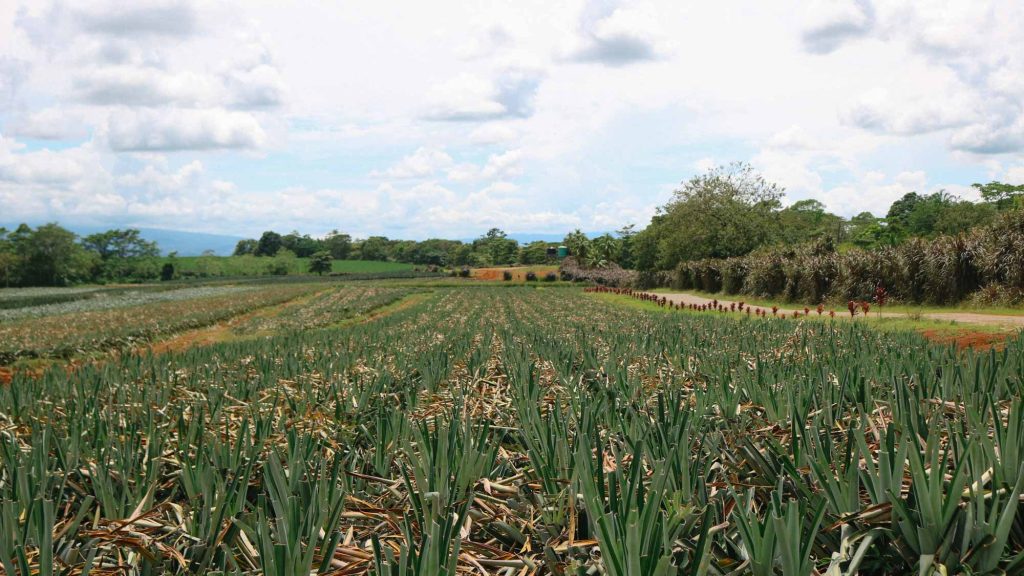
Companies dedicated to growing pineapples are obligated to place portable canopies in the middle of the field for workers to rest in the shade and recover from the high temperatures. Photo: Maria Laura Molina.
Exporting pineapple from Costa Rica is the new gold rush, making more than one billion dollars ($1,024,000,000) during 2021, according to data from the Foreign Trade Promoter (Spanish acronym: PROCOMER) and to do so, agro-exporters need hands and legs. Many hands and many legs.
According to data from the National Chamber of Pineapple Producers and Exporters (Spanish acronym: CANAPEP), its industry creates more than 32,000 direct jobs.
To supply this enormous workforce, some companies employ “contractors,” who recruit immigrants in offices and residences in San Jose, Los Chiles, San Carlos, Nicoya or Santa Cruz.
We went to those houses and offices looking for them, and after several failed attempts, we managed to get one of them to agree to give us an interview.
He’s a contractor for one of the pineapple farms where, according to what he told us, at least 600 people work in this form, the majority (70%) of Nicaraguan origin.
We interviewed him in an office that he has behind his house in Boca Arenal, half an hour by car from the farm that he works for. He looks like he’s about 50 years old, has a long face and asks us not to take photos of him.
“In the area, not all contractors are going to agree to an interview… to not say that none will. Why? Because the figure of the contractor, even for many farms, is a fraudster,” he tells us with a touch of nervousness.
Among migrants, the bad reputation of "contractors" is widespread. They point to them as the people who recruit and pay the laborers, but also who "take a bite" or charge "commission" on a part of the money they should receive.
"In my case or in our case, I agreed to the interview because the work we do is totally transparent," he clarified at the beginning of the conversation.
“What we do is hire the personnel that they (the company) use as labor. We take care of making all payments to the personnel. We’re committed to giving them everything in order. Payments are made by deposit; they’re never paid in cash. The payment statement is given to them before payment so that they can review it and if they have any disagreement, they can clarify it,” he explained.
Although the house is very big, the office where we talked is very small, just a desk, two printers and a telephone. As the questions progressed, the contractor's gestures became tense, he began to clasp his hands tightly, and the expression on his face became irritated.
“I see the contractor more as a figure so that work doesn’t stop, doesn’t get stuck. For the farm, it’s hard for an employee who is behind the desk to go out looking for people. We have personnel who go to different places in the area and look for people to put them to work. The company couldn't do that,” he argued.
By the time the interview came to a close, the contractor had completely abandoned the confident tone with which we began and asked us not to reveal his name for fear of reprisals.
From the Ministry of Labor, the national director of labor inspection, Victor Aguilar, clarifies that there are contractors of contractors, and that it’s not just any person who can be classified as such, but rather there are basic requirements that must be met.
“If it’s a person who is in charge of 20 workers in a crew, but he has payrolls and his own capital and does not depend on the money that the company gives him, he is an independent employer: an independent contractor,” he pointed out.
"Now, if the one "in charge" has crews of workers but doesn’t have his own capital, but rather what he does is mediate, there the company has responsibility, because it is jointly responsible, to the extent that it did not demand all those conditions of the contractor,” explained Aguilar.
The existence of contractors is an uncomfortable topic for everyone in the industry. Workers, business managers and publicly controlled entities are— for different reasons— very cautious when it comes to talking about the subject.
The interview with the national director of labor inspection went through several setbacks before it finally came to fruition. Initially we had set up a conversation with the vice minister of labor, Walter Villalobos, but they canceled it at the last moment, just when a video began to circulate on social networks that showed two employees at SYR stores in San Jose being hit on the back with a pipe.
According to Aguilar, the most common labor complaints they receive against pineapple companies are for failure to pay wages, prohibited shifts (more than 12 hours), lack of personal protective equipment, lack of hydration (water needs to be provided in the field or break time offered for employees to recover), or the lack of portable canopies for workers to take breaks in the shade.
Although immigrant workers contribute 11% of the gross domestic product of Costa Rica’s economy, as revealed in a 2018 study by the Organization for Economic Cooperation and Development (OECD), their rights are not always respected. The same study acknowledges "problems related to legal employment procedures for immigrants in certain occupations and lack of access to certain public services."
Even more revealing is that "the income of workers from Nicaragua is equivalent to 60% of the wages earned by native workers," according to that study.
Other data helps to portray the dimension of the disparity in working conditions between Costa Rican and foreign workers, such as data provided by the study "Migrants in Costa Rican Agriculture: The Case of Pineapples and Bananas," by researcher Gustavo Gatica, from the Center for Research in Culture and Development of the State Distance University (Spanish acronym: UNED), which highlights that "in pineapple activity, for every Costa Rican worker without social security, there are five foreigners without this right."
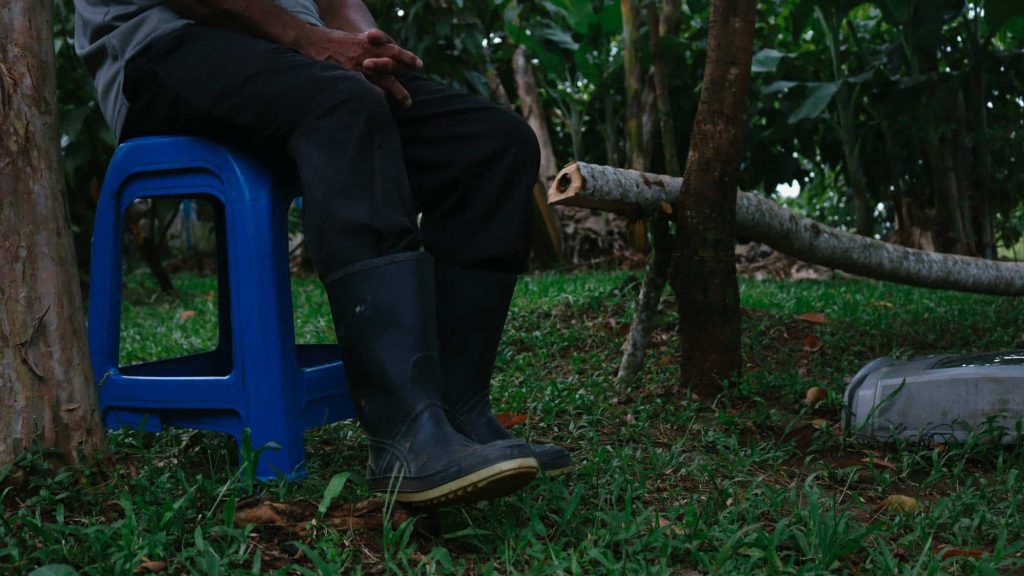
This pineapple farm worker reports that he earns ₡30,000 colones (about $51 USD) a week and ₡50,000 ($85) when things go better. That salary is barely enough for him to pay the rent for the rancho-style home where they live and buy food. Photo: Maria Laura Molina.
“What happens is that the large agricultural companies go to so-called contractors. That is what is known as the “straw man” in the doctrine. In other words, it’s any neighbor's son who doesn’t have his own means so he's the one who hires the workers and provides them to the company,” explained labor lawyer Esteban Calvo.
To Calvo, this figure is a strategy used by some companies to evade their responsibilities with their employees, introducing a third party who does not really have the conditions of a true businessman.
After the findings and testimonies that we had been collecting throughout this investigative report, we also wanted to interview Abel Chaves, president of the National Chamber of Pineapple Producers and Exporters (CANAPEP), which has 34 companies in this agro-export sector in the group.
Through his press spokesperson, they asked us to send questions in advance, but then they turned down arranging the interview.
Instead, from his office, they sent an email detailing a dozen internal chamber guidelines on good labor practices.
These guidelines show, precisely, the detailed knowledge that the industry has about the labor exploitation that exists at many farms and the concern that these abuses prompt among the producers themselves.
The guidelines indicated that the chamber’s affiliates do not recognize as valid practices: hiring labor through contractors, exposing workers to chemicals that are harmful to health, any type of discrimination, lack of insurance through INS and violating its employees’ right to social security, among others.
To UNED researcher Eva Carazo, the complaints that we collected during this investigation are general problems in the industry, and not exceptional or sporadic cases.
The researcher participated in a large study sponsored by the European Union and the Oxford Committee for Famine Relief (OXFAM) that observed the conditions of pineapple production in Costa Rica and their impact on human beings.
Carazo explained that, when investigations or complaints about contamination or a breach in labor laws arise, visitors and the press are offered a tour of the facilities of a "model farm" where all labor and health standards are met.
The UNED researcher reported that, during her study in conjunction with OXFAM Germany, they managed to enter the farms and interview 42 workers because they had support from an organization linked to the supermarket chains that buy Costa Rican pineapples in Europe.
But fields and pineapple farms aren’t the only territory where "contractors" are active. In cities, far away from the sun that scorches crops and laborers, another legion of immigrants does cleaning jobs, restocks and arranges items on supermarket shelves and works as cashiers in commercial stores. The contractors cast their shadow there as well.
Mario, as we’ll call him to protect his identity, arrived in Costa Rica fleeing the 2018 political crisis in Nicaragua. He looked for work here and found employment in a discount supermarket. Since then, he has settled into the industry and told us, from the inside, what happens in those businesses.
The contractor who recruited him, says Mario, “keeps” his overtime pay every day and punishes him when he is absent (even due to illness), despite the fact that the supermarket owner sends the contractor enough money to cover full salary, overtime and holidays, according to the young man.
Another supermarket worker, who also asked us not to reveal his name, denounced that the "contractor" punishes him financially when he misses work. “If you miss, they deduct the day, which is 10,000 colones (about $17 USD). Aside from that, they take an extra day from you. In other words, they deduct 20,000 colones (about $34) for one day that you miss, even if you get sick or have an emergency. To them, there’s no justification."
"To [the supermarket owners], Nicaraguan employees are dispensable. They’re disposable: 'I don’t like how you work, I don't need you.' 'Better get out of here.' 'You don't work well, you got here late, get out of here.' 'I’ll call the contractor to send another.'"
This dark pit, where labor rights are almost non-existent, is a parallel universe, an unknown or invisible place in public opinion until a video circulated on social networks, showing how two employees on their knees were hit with a pipe in a store in San Jose.
There, at that moment when the story went viral on social networks and everyone was talking about it, the voices of some victims emerged and public outrage forced politicians and officials to act.
“The cashiers spend 12 hours on their feet assisting customers. They aren’t allowed to go to the bathroom for a long time and if they go to the bathroom frequently, they get annoyed, or they now say that they are useless, they sack them and send someone else,” that supermarket worker recounted indignantly.
One of these supermarket cashiers, whom we’ll call Ana to protect her identity, recounted her experience this way: "They make you feel the most miserable, they yell at you. They tell the workers that if something doesn't show up, they're going to put them in a room to get beaten. They don't get to that point with me, but they yell at you, they demand, they pressure you. Sometimes they don't even give you a lunch hour, just 20 minutes," she says.
Ana also told us that she was fired from the last supermarket she worked for because she refused to pay the “fine” of 5,000 colones that her supervisor charged her for the “offense” of having checked her cell phone during work hours.
Jeudi Rojas is one of the contractors that supplies personnel to Multi Ahorros and La Nacional supermarkets, in Alajuela, where some of the complaints of abuse and mistreatment come from.
Rojas alleges that these complaints are from employees who left resentful and affirmed that many of them are Nicaraguan and that they have little work discipline or that they are absent unexpectedly. "They tell you, 'tomorrow I'm going to Nicaragua.'"
Rojas pointed out that the owners of these supermarkets are Asian and that they turn to him as a contractor because they don’t speak Spanish and don’t know how to deal with institutions such as the Costa Rican Social Security Fund (CCSS) or INS (National Insurance Institute).
“What happened with the SYR people (the video where they hit two employees with a pipe) is completely unconnected to us. In fact, the people we work with are Orientals and they are very upset because they say: 'Yikes, they (from SYR) messed it up because now people think that all of us (Orientals) are bad.'”
At the same time that this team of journalists was investigating the issue, Tomoya Obokata, United Nations special reporter on contemporary forms of slavery, visited Costa Rica and met with immigrants, laborers, business managers, politicians, officials, and labor unionists. In his conclusions, the reporter stated that, in labor matters, the country has a "bureaucratic and ineffective" system of controls and punishments.
Upon concluding his investigation, Obokata concluded that many of the victims in this system– especially immigrants– are exposed to practices comparable to forms of modern slavery.
"In Costa Rica, these abuses go unpunished because those who endure them are afraid to file complaints due to the fragility of their immigration status," denounced the UN reporter.
In Guanacaste, where real estate development is focused on luxury beachfront homes, condominiums with amenities and high-end hotels, many immigrants from Nicaragua are also the workforce whose sweat equity goes into those buildings.
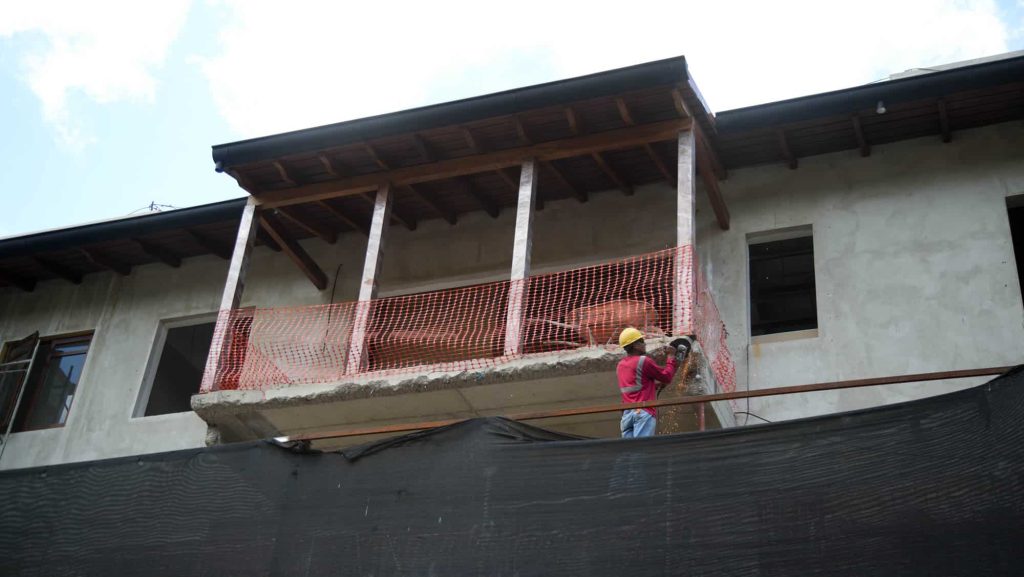
Construction workers in Guanacaste say they are paid ₡1,300 (about $2) per hour, or a little more, depending on the work they do. Photo: Ruben Roman.
In Cabo Velas de Flamingo, Santa Cruz, on October 4, a truck carrying laborers to work on a construction site flipped over while going up a hill. Several of the 22 workers who were crowded in there were injured and bruised by the accident.
They were all traveling in the truck bed of a Mitsubishi that had been in use for 23 years, without permission to transport employees and with no other safety features than the strength of their own hands.
A week after that accident, we visited Cabo Velas to talk with the victims, who were mostly Nicaraguan immigrants.
Half an hour from the construction site, before nightfall, we found a precarious wooden house, with chickens running around a stone path and a leveled dirt corridor. Several young people who work in construction in the area live there.
After some hemming and hawing, one of the people injured got up the nerve to tell us about the moment of the accident. He spoke with a thick Nicaraguan accent and was still wearing a bandage on his arm.
"The truck flipped over to the right side and all the people who were riding on the left side fell on top of me. All the people who were riding on the right side fell on top of us. Some went out like this, in the air, due to the bump, everyone complaining, they had scratches here on their faces, here on their necks. One workmate had his skin torn up and bruises on his back. Another workmate had a broken nose."
The architect responsible for the project where the injured people were working is named Jose Mora and he acknowledged his mistake in not checking the status of the pickup truck that was transporting his employees, nor finding out if the driver had permits to transport personnel.
“I hire a truck to take them up that slope that’s there.... Because if I tell them just get here, they’re going to have to walk up that big hill there and they’re going to get here very tired,” he explained.
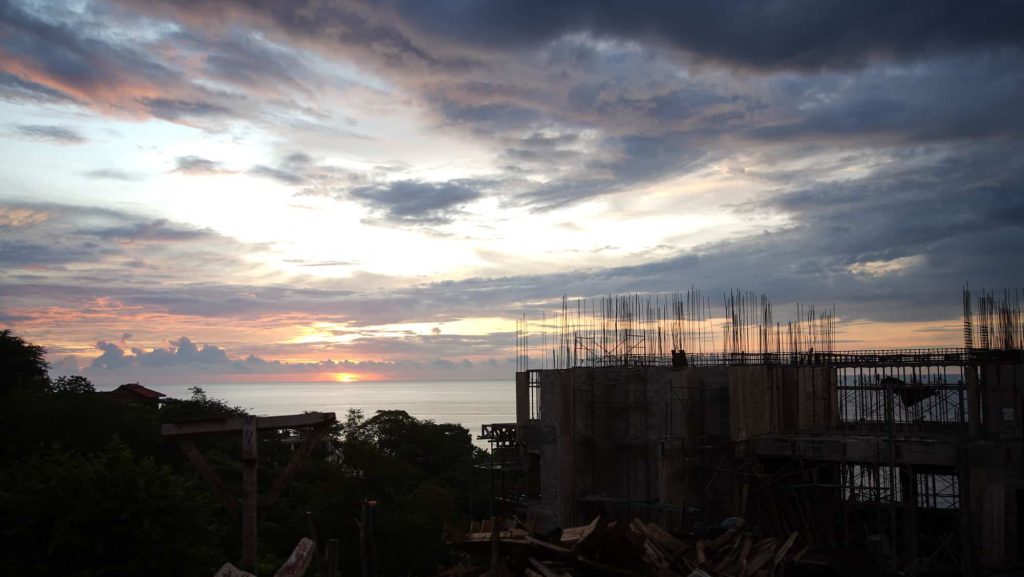
Transportation to construction sites, especially if they are up very steep hills or slopes, is a problem for workers since they don’t have their own vehicles and there is no public transportation to these places. Photo: Ruben Roman.
The architect, Mora, admitted his carelessness, but at the same time, he justified it by claiming that this is the traditional "style" of transporting employees in the area.
“Those are the conditions in which they transport all the workers. [If] you stand there in front of the Banco Nacional (in Flamingo), at five o'clock, you see a lot of trucks going with the workers behind there."
In Guanacaste, transporting employees in a truck bed, like cattle, contrasts with the prosperity of an industry that, last year, processed permits to build 6.4 million square meters (about 69 million square feet), according to data from the Federated College of Engineers and Architects (Spanish acronym: CFIA).
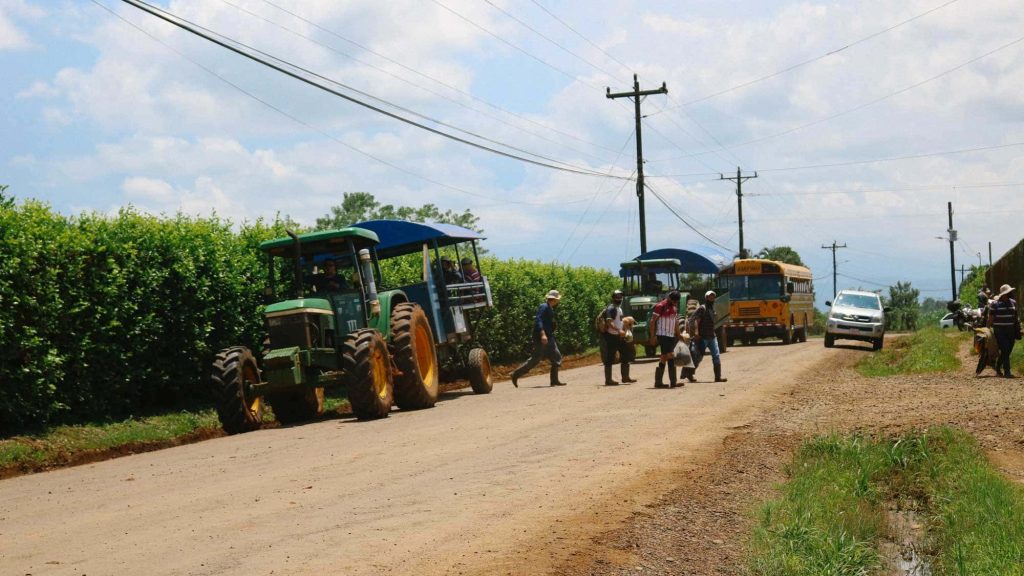
One of the most common ailments among pineapple workers is chronic kidney disease, due to the high temperatures they are exposed to daily. Photo: Maria Laura Molina.
The severe working conditions that these immigrants experience in agricultural and construction work takes its toll on them as their own bodies deteriorate. One way they generally pay is with damage to their kidneys, which can be verified in the cases that area health services look after daily.
Man Lug Rodríguez, an emergency room doctor at the hospital in Los Chiles, realizes the consequences that the heat and long shifts in the fields and at construction sites have on workers.
“They come to a consultation because they have muscle pains, they report cramps or they don't feel their legs or things like that. And some come in very dehydrated. They are generally young, 20 or 30 years old. You realize they come repeatedly because they are working in grueling heat and they get dehydrated. By the time they realize it, the kidney has already suffered damage."
Carlos, the worker who was fired after founding a union, gave an account of this diagnosis in his own body. “I started at the pineapple farms healthy, and I’m diabetic, I’m hypertensive, I have blood sugar problems, high blood pressure, cholesterol, uric acid, my kidneys are worn out. What more do I need? Just for me to die, nothing else."
Gatica, the UNED researcher, has been working with immigrants from the northern area of Costa Rica for ten years, and when it comes to analyzing the causes of these severe work schemes, he points out that the legal introduction of the figure of the contractor made working conditions precarious in agriculture and construction.
In addition, he added, it overburdens the functions of the State, which has to take on the costs of their medical care, since a good portion of these workers aren’t signed up for Social Security or for INS occupational risk insurance by their employers.
Gatica agreed with the assessment of the United Nations special reporter, Tomoya Obokata, regarding contemporary forms of slavery. Both point to the weak supervision exercised by the Ministry of Labor’s labor inspection department as one of the key points that makes it easier for a group of companies to violate the human rights of immigrants.
"Who wins?” asked researcher Gatica, with an ironic gesture. “Well, the one who hires in these irregular and disadvantageous conditions,” he summed up.
This special work was carried out jointly by The Voice of Guanacaste, Interferencia de Radios UCR and Confidencial of Nicaragua. The original idea came from Maria Fernanda Cruz, Hulda Miranda and Cindy Regidor. Journalists Rita Valverde, Katherine Estrada and Maria Laura Molina participated in reporting the stories and data. The photos are by Maria Laura Molina, Ruben Roman and Cesar Arroyo. You can find the report published by Interferencia here, and by Confidencial here.
PUBLICIDAD 3M
PUBLICIDAD 3D